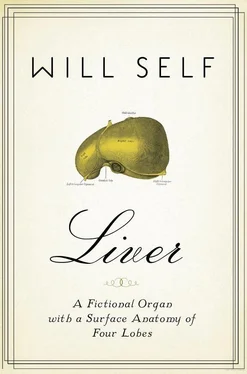It seemed that Weiss hadn’t expected her to raise this point so soon. The moustache winced, and he nervously shot the pink cuffs of his striped shirt. Marianne busied herself in her handbag — only the Monsignor had the sang-froid to reply: ‘Well, now, Mrs Beddoes, these are very early days, and the procedure by which such extraordinary events are authenticated is a lengthy one. I’m only on secondment here, preparing initial reports for the diocesan bishop — ’
Joyce silenced him with another imperious wave. ‘That’s quite enough of that, thank you, Monsignor Reiter. Let me put it another way: if you want me to cooperate at all, you’ll have to answer that question right away; otherwise I’ll pack my bag and leave.’
Silence. Holy, holy, holy, Lord God of Sabaoth, Heaven and earth are full of. dust and cat hair . The eyes of the delegation all slid to the kitchen doorway where Vreni Stauben was standing, a spoon in one squashy hand, a tea strainer in the other. Her usually mild expression was tempered by an intensity Joyce hadn’t seen before: a fierce parental pride, not in some mundane swimming, jumping or instrumental achievement — but in a transcendent one.
After Derry died their friends had drifted away. Joyce had expected this — been prepared for it, too. Derry had been far more gregarious than her; it was he who organized get-togethers. She prized this in him, just as he valued her asperity, her reserve. It was not that Joyce was incapable of friendship; loyalty, she felt, was akin to insurance payments — something you kept up . There were her two friends from girlhood: Ruth, now retired to the Yorkshire Wolds, and Iris, who had gone down to London, where she maintained a long-lasting lesbian union. Then, when Iris’s companion had died, she uprooted again and returned to Birmingham. She had stayed with Joyce for a month the previous year, while she hunted for a suitable cottage in the Forest of Arden. An indefatigable presence, round-faced, petite, vigorous .
Then there were Miriam and Sandra, both former colleagues; although her friendship with the former, who had once been her secretary, was always a little strained . On several occasions Miriam had negotiated the tortuous arterial roads all the way from Snow Hill in order to take Joyce for her radiotherapy at Mid-East.
Sandra, who had been a long-serving and much revered consultant paediatrician, now reposed in the leafy splendour of Edgbaston. Every room of her Arts and Crafts villa was like a conservatory, while the entire house resounded with the song of grandchildren — or such was Joyce’s impression on her infrequent visits. Sandra dispensed meals whenever required — came over, too — but she was hardly proactive. I had to ask her to take me to the clinic — and that was hateful. Shameful .
Self-pity was not in order, though: I had a life , and even, briefly, after Derry had died, another lover ; a source — surely justifiable? — of considerable satisfaction. Age would not wither me . Despite all this, the way those couples had dropped me hurt. The self-satisfied solicitors and their WI wives, it was they who were withering as they dealt the pack of remaining individuals into bridge pairs.
Obscurely, Joyce blamed Derry for this, and related it to a failure in their intimacy: they had been close, certainly , yet the bulk of the unspoken communication between them had been that there was nothing much worth saying .
All this while the three seated Swiss looked at the one standing; all this while the Magi adored the Saviour’s mother. It was preposterous, most definitely , the dippy shrine to the miraculous teenager; the beatification of Gertrud — first spotty, then holy. Oddly, Joyce now felt empowered by all those wordless decades she had spent with Derry. There was a shrewdness in them — a native cunning.
The Swiss had their coffee; Joyce took her tea. They talked, a devilish interplay between pragmatism and spirituality. It transpired that Ueli Weiss had a severely disabled son. ‘A hard birth, there was not enough oxygen,’ he explained, and Joyce thought he’s describing his marriage as well . The baby had been — and this was stated like a menu choice — ‘a vegetable’: deaf, blind, dumb, paralysed. One day, Weiss, as had been his custom, took the persistently vegetative infant with him to visit Gertrud Stauben, who was in hospital, dying of leukaemia.
Joyce could envisage Vreni’s daughter, her skin as translucent as dripping wax, stretching out her anaemic fingers to draw strength from the little boy’s potato head. ‘There are three classes of such happenings,’ Monsignor Reiter said. ‘ Quoad substantiam — this is the biblical act of the Saviour, and some of his saints.’ The young prelate had sat and crossed his legs, the skirts of his soutane falling open to reveal tan cotton trousers. ‘Then there is quoad subiectum , which, while not entailing the full resurrection of the dead, can nevertheless exhibit the full restitution — restitutio in integrum — of irreparably damaged organs; the growth, even, of new ones.’
So far as Joyce was concerned, it was this second kind of. not faith but collective suspension of disbelief that Reiter was investigating. The dying girl had laid on her hands more than fifteen years ago: ‘My son, he was, as I say, a vegetable. Now, he is not the totally normal fellow — no one is saying this — ’
‘But he feeds himself, dressing too,’ Marianne broke in. ‘He can walk and is talking these few words, so.’ She leant forward, her usually saturnine face animated. ‘This was baby with no brain — Siis Hirni isch Hackfleisch — ’
‘The grinded meat,’ Weiss put in.
‘Now he is doing these things, but with what?’ Her own struggle to be understood echoed this incomprehensible happening.
Joyce could picture the young man: wet-chinned, butting his big head at a door, his features grosser than his father’s, and in place of Weiss’s thick moustache the charcoal smudge of male puberty.
Reiter was pedantic: ‘We don’t expect the doctors to support what we’re trying to prove for one second; nor do we look for doctors who are Catholics; the evidence is the evidence and we will abide by it. But even getting the doctors to give me interviews, the hospitals to release the records, and, naturally, arranging for Erich to have the necessary scans and examinations — this is taking the longest time, you see.
‘Then there is the relationship between the diocese and Rome. We are,’ he said with a smirk, ‘like any other very large organization, so, there is much paperwork. Once already, the Bishop here in Zürich has referred this matter, but the report has come back: there must be more tests, further confirmation.’
It was easy to understand Vreni Stauben’s motivation: better than memory — or formaldehyde — faith would be the ultimate preservative; an acknowledgement from the highest level of the beatification that every parent bestows on her child. As for Reiter, he was a functionary, and this was his equivalent of a doctor’s cure; Joyce well understood how such statistics secured funding and advanced careers. But Ueli Weiss and Marianne Kreutzer? It was difficult to peg them as zealots . Was there a murkier guilt that needed assuaging, some sin of dereliction that must be shriven? Or was it only that this was a middle-aged man with a business card, who had never done much business worth speaking of? Vreni Stauben had mentioned a car dealership in Berne that Weiss had inherited; however, in her very glancing remarks there was the suggestion that this was a going concern, for which he had done very little of the running.
Читать дальше












